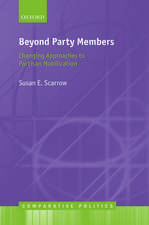Electoral Reform and National Security in Japan: From Pork to Foreign Policy
Autor Amy Catalinacen Limba Engleză Paperback – 20 dec 2017
| Toate formatele și edițiile | Preț | Express |
|---|---|---|
| Paperback (1) | 237.74 lei 6-8 săpt. | |
| Cambridge University Press – 20 dec 2017 | 237.74 lei 6-8 săpt. | |
| Hardback (1) | 699.26 lei 6-8 săpt. | |
| Cambridge University Press – 24 ian 2016 | 699.26 lei 6-8 săpt. |
Preț: 237.74 lei
Nou
Puncte Express: 357
Preț estimativ în valută:
45.51€ • 49.45$ • 38.25£
45.51€ • 49.45$ • 38.25£
Carte tipărită la comandă
Livrare economică 21 aprilie-05 mai
Preluare comenzi: 021 569.72.76
Specificații
ISBN-13: 9781107546455
ISBN-10: 1107546451
Pagini: 266
Ilustrații: 23 b/w illus. 7 tables
Dimensiuni: 153 x 230 x 15 mm
Greutate: 0.4 kg
Editura: Cambridge University Press
Colecția Cambridge University Press
Locul publicării:New York, United States
ISBN-10: 1107546451
Pagini: 266
Ilustrații: 23 b/w illus. 7 tables
Dimensiuni: 153 x 230 x 15 mm
Greutate: 0.4 kg
Editura: Cambridge University Press
Colecția Cambridge University Press
Locul publicării:New York, United States
Cuprins
1. Introduction; 2. Electoral systems, electoral strategies, and national security; 3. Measuring electoral strategies with thousands of candidate election manifestos; 4. Electoral strategies shifted from pork to policy; 5. Electoral strategies shifted to national security; 6. Electoral strategies of opposition focused on policy; 7. Impact on security policy; 8. Conclusion.
Recenzii
'Can electoral incentives be powerful enough to change politicians' behavior in countries like Japan where clientelism was deeply ingrained for decades? In this path-breaking book, Catalinac demonstrates with an original data set built from thousands of candidate election manifestoes that members of Japan's longstanding dominant party, the Liberal Democratic Party, shifted their campaign rhetoric from pork barrel to policy after the change in electoral rules in 1994. She goes on to provide unmistakable evidence for the centrality of electoral incentives in Japan's foreign policy making. This will be a staple reading not only for students of Japanese politics, but also for anyone interested in comparative politics, institutional design, and the politics of national security.' Frances Rosenbluth, Yale University, Connecticut
'If, as Tip O'Neill put it, 'All politics is local', Japan's used to be the most local of them all, and especially so when it came to national security issues. We Japan experts speculated that in the 1990s this had begun to change; but until Amy Catalinac's brilliant and innovative study we didn't really know the exact extent, and more importantly, exactly why. Thanks to her creative method of analyzing campaign manifestoes and her extensive interviews with politicians, now we do, and her nuanced but well-supported answer may be surprising to some. This important book has significant ramifications not only for the fields of Japanese politics and comparative politics, but for security studies as well.' Ellis S. Krauss, University of California, San Diego
'In this important new book, Catalinac develops a theory about how domestic political institutions shape debate about national security issues. Using the Japanese case, she shows that electoral reforms were the catalyst for rising attention to national security topics among conservative politicians. Through textual analysis of campaign materials, the book brings an impressive range of evidence to bear in support of the theory. The book will demand attention from scholars of Japanese politics and anyone with an interest in how institutional change can shift the national political agenda.' Christina Davis, Princeton University, New Jersey
'As a reader, I was indeed reminded of one of the advantages of a book project, where a good amount of descriptive accounts can be added to supplement quantitative analyses. The author showcases deep knowledge and rich information on elections on the ground in contemporary Japan.' Kyohei Yamada, Social Science Japan Journal
'If, as Tip O'Neill put it, 'All politics is local', Japan's used to be the most local of them all, and especially so when it came to national security issues. We Japan experts speculated that in the 1990s this had begun to change; but until Amy Catalinac's brilliant and innovative study we didn't really know the exact extent, and more importantly, exactly why. Thanks to her creative method of analyzing campaign manifestoes and her extensive interviews with politicians, now we do, and her nuanced but well-supported answer may be surprising to some. This important book has significant ramifications not only for the fields of Japanese politics and comparative politics, but for security studies as well.' Ellis S. Krauss, University of California, San Diego
'In this important new book, Catalinac develops a theory about how domestic political institutions shape debate about national security issues. Using the Japanese case, she shows that electoral reforms were the catalyst for rising attention to national security topics among conservative politicians. Through textual analysis of campaign materials, the book brings an impressive range of evidence to bear in support of the theory. The book will demand attention from scholars of Japanese politics and anyone with an interest in how institutional change can shift the national political agenda.' Christina Davis, Princeton University, New Jersey
'As a reader, I was indeed reminded of one of the advantages of a book project, where a good amount of descriptive accounts can be added to supplement quantitative analyses. The author showcases deep knowledge and rich information on elections on the ground in contemporary Japan.' Kyohei Yamada, Social Science Japan Journal
Notă biografică
Descriere
This book argues that Japanese politicians pay more attention to security issues nowadays because of the electoral reform.















